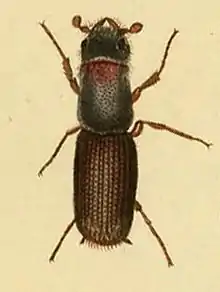Platypodinae
Platypodinae is a weevil subfamily in the family Curculionidae. They are important early decomposers of dead woody plant material in wet tropics; all but two species are ambrosia beetles that cultivate fungi in tunnels excavated in dead wood as the sole food for their larvae. They are sometimes known as pinhole borers.[1]
| Platypodinae | |
|---|---|
 | |
| Platypus cylindrus | |
| Scientific classification | |
| Domain: | Eukaryota |
| Kingdom: | Animalia |
| Phylum: | Arthropoda |
| Class: | Insecta |
| Order: | Coleoptera |
| Infraorder: | Cucujiformia |
| Family: | Curculionidae |
| Subfamily: | Platypodinae Shuckard, 1840 |
| Tribes | |
| |
Genera
Tribus: Mecopelmini
- Mecopelmus
Tribus: Platypodini
- Austroplatypus – Baiocis – Carchesiopygus – Costaroplatus – Crossotarsus – Cylindropalpus – Dendroplatypus – Dinoplatypus – Doliopygus – Epiplatypus – Euplatypus – Megaplatypus – Mesoplatypus – Myoplatypus – Neotrachyostus – Oxoplatypus – Pereioplatypus – Peroplatypus – Platyphysus – Platypus – Teloplatypus – Trachyostus – Treptoplatypus – Triozastus
Tribus: Schedlariini
- Schedlarius
Tribus: Tesserocerini
- Diapodina - Tesserocerina[2]
See also
References
- Jordal, Bjarte H. (2015). "Molecular phylogeny and biogeography of the weevil subfamily Platypodinae reveals evolutionarily conserved range patterns". Molecular Phylogenetics and Evolution. 92: 294–307. doi:10.1016/j.ympev.2015.05.028. PMID 26190520.
- WikiSpecies
 Data related to Platypodinae at Wikispecies
Data related to Platypodinae at Wikispecies
This article is issued from Wikipedia. The text is licensed under Creative Commons - Attribution - Sharealike. Additional terms may apply for the media files.